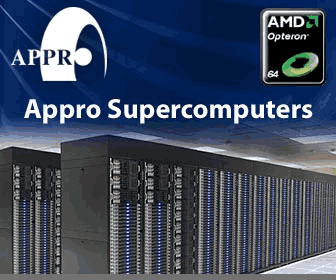ACADEMIA
HP delivers technologies to speed customers' research, design efforts
 Accelerators are alternative technologies – such as general purpose graphical processing units, field programmable gate arrays, and custom ASICs – that help applications run up to 20 times faster so customers can speed up research and design while minding costs. Accelerators are ideal for customers in the fields of oil and gas, financial services, government and defense, life and material science, digital content creation, electronic design automation and computer-aided design that require massive computational capacity. Financial services institutions, for example, are using this technology to quickly analyze data to provide them with a competitive advantage and enable them to respond rapidly to changing market dynamics. Energy companies are leveraging accelerators to analyze enormous volumes of seismic data faster and more efficiently, enabling them to rapidly locate new deposits of oil. “As individual processor cores are reaching their physical limits of complexity and speed, we can no longer rely on processor technology alone to meet users’ constant demand for performance growth,” said Winston Prather, vice president and general manager, High Performance Computing, HP. “By teaming with partners and customers, HP is offering customers alternatives such as hardware accelerators and multi-core optimization that deliver increased performance and help bring innovation to market faster.” HPC Accelerator Program As part of the HPC Accelerator Program, HP partners with software and hardware vendors to introduce qualified accelerator products into HP ProLiant and BladeSystem servers. The program helps customers choose between various HP-qualified accelerator technologies. Current partners include:
Accelerators are alternative technologies – such as general purpose graphical processing units, field programmable gate arrays, and custom ASICs – that help applications run up to 20 times faster so customers can speed up research and design while minding costs. Accelerators are ideal for customers in the fields of oil and gas, financial services, government and defense, life and material science, digital content creation, electronic design automation and computer-aided design that require massive computational capacity. Financial services institutions, for example, are using this technology to quickly analyze data to provide them with a competitive advantage and enable them to respond rapidly to changing market dynamics. Energy companies are leveraging accelerators to analyze enormous volumes of seismic data faster and more efficiently, enabling them to rapidly locate new deposits of oil. “As individual processor cores are reaching their physical limits of complexity and speed, we can no longer rely on processor technology alone to meet users’ constant demand for performance growth,” said Winston Prather, vice president and general manager, High Performance Computing, HP. “By teaming with partners and customers, HP is offering customers alternatives such as hardware accelerators and multi-core optimization that deliver increased performance and help bring innovation to market faster.” HPC Accelerator Program As part of the HPC Accelerator Program, HP partners with software and hardware vendors to introduce qualified accelerator products into HP ProLiant and BladeSystem servers. The program helps customers choose between various HP-qualified accelerator technologies. Current partners include: - ClearSpeed Technology, which offers Advance e620 accelerator cards that bring 64-bit, low-power acceleration to HP ProLiant and BladeSystem customers;
- Celoxica, which qualified its RCHTX acceleration board using AMD Torrenza technology on the HTX channel in HP ProLiant DL145 G3 servers, offering customers high-performance customizable processing; and
- NVIDIA, AMD, RapidMind and Mitrionics are contributing innovative programming technologies and tools to simplify development of accelerated applications.
HP offers customers best practices and guidance on these technologies to enable them to choose those that are most appropriate for their applications. The new HPC Accelerator Program also ensures that the latest acceleration technologies are researched, benchmarked and qualified for HP servers running HPC applications. HP Multi-Core Optimization Program and Toolkit The expanded HP Multi-core Optimization Program, originally launched in June, includes new partners and a toolkit that offers customers sources for multi-core guidance, all in one place. The program brings together developments from HP and its partners to provide open, non-proprietary solutions that enhance multi-core performance across a variety of industry-standard HPC architectures, platforms and operating environments. By optimizing multi-core solutions, customers can maximize application performance on multi-core systems, enabling larger simulations and more data analysis that is necessary to achieve their engineering, science and analytical goals. New members of the program include: Allinea, Interactive Supercomputing, The Portland Group, RapidMind, Stanford Pervasive Parallelism Lab and Visual Numerics. “With the reality of multi-core technology here today, we need better ways to effectively use the increased systems power available. The HP Multi-Core Optimization Program is a practical step in that direction,” said Kunle Olukotun, professor of computer science, Stanford University. “The collaborative work starting between HP and Stanford in addressing pervasive parallelism will allow us to jointly enhance knowledge on the theoretical and practical applied uses of multi-core technologies.” The Multi-Core Optimization Toolkit is a set of products, reference material, HP best-practice research, white papers and links to HP and partner website content that helps customers address and resolve how to effectively use multi-core technology in the marketplace. More information about the toolkit is available at www.hp.com/go/multi-coretoolkit. At the SC07 conference, Nov. 12 - 16, in Reno, Nev., HP will demonstrate BladeSystem and ProLiant servers enhanced with NVIDIA, Celoxica and ClearSpeed accelerators. More information on HP’s high-performance computing solutions is available at www.hp.com/go/hptc.
